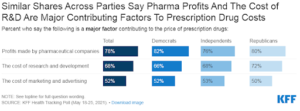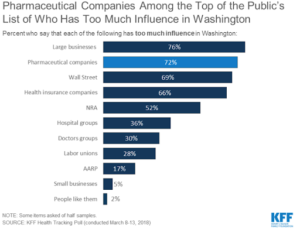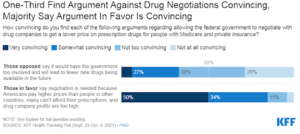MEMORANDUM
TO: Interested Partners
FR: Protect Our Care
DT: November 5, 2021
MEMO: The Build Back Better Act Will Transform Health Care for Millions of Americans
The Build Back Better Act will be the most significant expansion of U.S. health care since the passage of the Affordable Care Act. The legislation includes historic measures to lower the cost of prescription drugs and insurance premiums, extend affordable coverage to millions, expand Medicare benefits to cover hearing, and invest $150 billion in home care for seniors and people with disabilities. By passing Build Back Better, Democrats are proving their commitment to building a future where health care is a right, not a privilege.
Polling shows the health care measures in Build Back Better have nearly universal support, and voters of all parties want bold action on health care.
Under The Build Back Better Act:
- 48 million Medicare Part D enrollees will have out of pocket costs for prescription drugs capped at $2,000 per year.
- 9 million Americans will save on their monthly health insurance premiums
- 2.2 million Americans currently in the Medicaid “coverage gap” will gain health coverage
- 62 million Americans on Medicare will gain coverage for hearing
- Medicare will have the power to negotiate for lower drug prices. By 2030, more than 100 drugs will be eligible for Medicare price negotiation, in addition to insulin products.
- ALL Americans will be protected from Big Pharma’s arbitrary price hikes that rise faster than inflation
Build Back Better Lowers Prescription Drug Prices
Giving Medicare The Power To Negotiate Lower Drug Prices. For nearly 20 years, Medicare has been banned from negotiating the price of prescription drugs, and Big Pharma has been able to dictate prices while Americans pay three times more for their medications than people in other countries. Under Build Back Better, Medicare will be empowered to negotiate prices for select drugs purchased at the pharmacy counter and administered at a doctor’s office. Beginning in 2025, 10 drugs, in addition to insulin, will be negotiated with that number increasing to 15 drugs in 2026, and 20 drugs in 2028 and into the future. By 2030, more than 100 drugs will be eligible for Medicare price negotiation, in addition to insulin products. Drug companies who refuse to come to the negotiating table will be subject to an excise tax.
Capping Out-Of-Pocket Spending For Seniors. Seniors with serious conditions like cancer, multiple sclerosis, and rheumatoid arthritis could save thousands of dollars on prescriptions under the Build Back Better Act. Medicare Part D out-of-pocket costs for prescription drugs will be capped at $2,000 per year beginning in 2024. The redesign of Medicare Part D will also allow out-of-pocket spending to be smoothed over the course of the year, so patients are not forced to pay the entirety of their out-of-pocket cost all at one time.
Making Insulin Accessible And Affordable. Insulin co-pays for all Americans with insurance will also be capped at $35 each month.
Putting An End To Outrageous Price Increases. Build Back Better stops Big Pharma from raising price increases faster than the rate of inflation. For example, Humira, a medication commonly used to treat rheumatoid arthritis, is one of the nation’s highest revenue generating drugs, raking in $21 billion in sales in 2019. AbbVie, Humira’s manufacturer, has hiked the price of Humira 27 times, including in January 2021 when it raised its cost by 7.4 percent. This cap would apply to all Americans, no matter whether you are insured or not, and no matter what kind of insurance you have, and is essential to stop arbitrary price increases on essential medications. Over the past 20 years, price increases for brand-name drugs in Medicare Part D have risen at more than twice the rate of inflation.
Build Back Better Lowers Health Insurance Premiums
Nine Million Americans Will Save On Monthly Premiums. Nine million Americans will save an average of $600 annually on their premiums when they buy insurance on their own through the ACA Marketplaces. For a family of four making $80,000 a year, premiums will drop nearly $250 a month, or nearly $3,000 a year.
Expanding Health Coverage For Millions Of Americans. The Congressional Budget Office estimates that ACA enrollment would increase by 3.6 million people including 1.4 million who would otherwise be uninsured and 600,000 would have received unsubsidized coverage.
Reducing Income Coverage Disparities. Build Better Better ensures families above the 150 percent threshold pay no more than 8.5 percent of their income towards coverage. This will help middle-income families facing excessive premiums or living in high-premium areas.
Expanding Coverage for Communities of Color. The Center on Budget Policy and Priorities estimates the increased savings continued under Build Back Better will cause a sharp decline in the uninsured rate across every racial group, with one in three uninsured Black adults gaining coverage. Prior to the American Rescue Plan, more than 11 million uninsured adults were eligible for premium tax credits, with people of color making up roughly half of the group.
Build Back Better Expands Medicaid
2.2 Million Americans Currently Denied Medicaid Will Gain Health Coverage. The Build Back Better Act will allow more than two million Americans currently trapped in the Medicaid coverage gap to access zero dollar premium health coverage. Of those currently in the coverage gap, 62 percent are in the labor force, 30 percent are parents with children at home, more than 25 percent are essential workers, and 15 percent of adults have a disability.
Zero Dollar Premiums for Millions. In addition to covering the 2.2 million Americans in the Medicaid coverage gap, Build Back Better delivers zero dollar premium coverage to the 1.8 million uninsured individuals with incomes between $12,880 and $17,774 each year (100-138 percent of the federal poverty level). These plans
Drastically Reducing Racial Health Disparities. Closing the Medicaid coverage gap is the single most important policy to expand coverage and reduce racial inequities in the American health care system. People of color are more likely to have a lower median income and live in a state without Medicaid expansion, compared with their white counterparts. In 2019, 60 percent of individuals in the coverage gap were people of color.
Improving Coverage For Millions of Working Americans Whose Employer Coverage is Too Expensive Or Of Poor Quality. Millions of low-wage workers are offered employer health coverage that is cost prohibitive and not comprehensive. Over the past decade, premiums for low-wage workers have increased at nearly double the rate of wages. Build Back Better ensures that individuals who would be eligible if their state expanded Medicaid, can enroll in an ACA marketplace plan even if their employer offers coverage. This will allow low-wage workers to access comprehensive health coverage at little or no cost.
Build Back Better Expands Medicare Benefits
Millions Will Gain Access To Hearing Care. Build Back Better would add hearing coverage to Medicare Part B starting in 2024. Kaiser Family Foundation estimates that a Medicare hearing benefit could aid all 62 million Medicare beneficiaries, particularly the 36 million purchasing coverage on their own or simply going without. Hearing coverage under Build Back Better would include hearing rehabilitation and treatment services, as well as hearing aids. Build Back Better would also allow audiologists and hearing aid specialists to qualify for Medicare reimbursement.
Addressing High Out-Of-Pocket Costs. In 2018, Medicare beneficiaries paid an average out-of-pocket cost of more than $900 for hearing care. Only 30 percent of seniors over 70 who need hearing aids are able to use them, with Kaiser Family Foundation citing affordability as the likely culprit millions do not seek hearing care or hearing devices. Build Back Better expand Medicare to include hearing coverage by providing $35 billion in funding for hearing care.
Build Back Better Will Dramatically Improve Maternal & Infant Health
Providing 12 Months Of Continuous Coverage To Postpartum Women. In 2018, 45 percent of births were paid for by Medicaid, with 50 percent or more births covered by the program in 22 states. Medicaid covers 65 percent of all births to Black mothers. With Black maternal mortality rates 3.2 times higher than for white women, Build Back Better recognizes the expansion of Medicaid coverage to post-partum individuals is a pressing racial justice issue by providing 12 months of continuous coverage to postpartum women.
Millions Invested To Address Social Determinants Of Health. The Black Maternal Health Momnibus Act provisions included in the Build Back Better Act contain $175 million to address social determinants of maternal health at the local level. This would include once-in-a-generation investments in housing, nutrition, and environmental conditions with the explicit focus of improving maternal health.
Funding Health Equity Measures. The Build Back Better Act includes $295 million to bolster and diversify the perinatal health workforce, including funding for midwives and doulas whose involvement is essential to reducing maternal deaths. An additional $100 million has been included for maternal mental health equity and $50 million for maternal health research at Minority-Serving Institutions.
Directly Confronting Systemic Racism in Maternal Care. $50 million for training to address racism, discrimiation, and bias — originally part of the Black Maternal Health Momnibus Act — is included in the Build Back Better Act. This training for health care professionals is just one of the many necessary steps required to begin addressing racism in the American health care system and improve maternal health equity.
How Build Back Better Ensures Continuous CHIP Coverage
Keeping Children on Medicaid For A Full Year Who Abruptly Lose Coverage. The Build Back Better Act would require states to provide 12-month continuous coverage for children on Medicaid and CHIP. As of January 2020, 31 states provided continuous coverage. States that don’t provide continuous coverage experience increased churn, or children who dis-enrolled and re-enrolled in coverage within the same year. Continuous coverage would help reduce racial disparities as nearly 14 percent of Hispanic, 12 percent of Black, and 13 percent of children in low or moderate income households faced uninsurance for all or part of the year.
Build Back Better Expands Home And Community-Based Services
Build Back Better Will Allow Millions of Americans To Grow Old At Home. Medicaid is currently the largest provider of home and community-based care, providing essential services to seniors and people with disabilities. Build Back Better will provide an additional $150 billion for home and community-based services, that would provide care to the 2.5 million Americans already participating in the program, and help alleviate the current waitlist of more than 800,000 individuals. Federally provided home and community-based services funds helped more than 100,000 individuals return to their homes and communities from nursing facilities between 2008 and 2019, highlighting the enormous need for Build Back Better to strengthen this essential program.
Nearly 820,000 People On HCBS Waiting Lists Gain Assistance. In 2018, Medicaid waivers provided care for 2.5 million HCBS enrollees. As the aging population continues to grow, over three-quarters of states have HCBS waiver waiting lists. Individuals spend an average of 39 months on waiting lists prior to eligibility screening. The Build Back Better Act will provide HCBS funding to help the nearly 820,000 Americans on waiting lists.
HCBS Expansion Strengthens Direct Care Workforce. The direct care workforce is disproportionately composed of black, female, and lower-wage workers. In 2018, 58 percent of direct care workers earned less than $30,000 a year. Additionally, nearly one-third of workers live in a low-income family that makes less than 200 percent of the federal poverty line. 82 percent of the direct care workforce are women and one in four workers are Black. The Build Back Better Act will combat the HCBS workforce shortage that has been exacerbated by the Covid-19 pandemic and historically low wages.
Families Will Save An Estimated $5,800 In Home Care Costs. Older Americans and people with disabilities are often forced to liquidate their assets to afford as little as two years of in-home care. The HCBS provisions included in the Build Back Better Act will save families paying out-of-pocket an estimated $5,800 a year for four hours of care per week.






